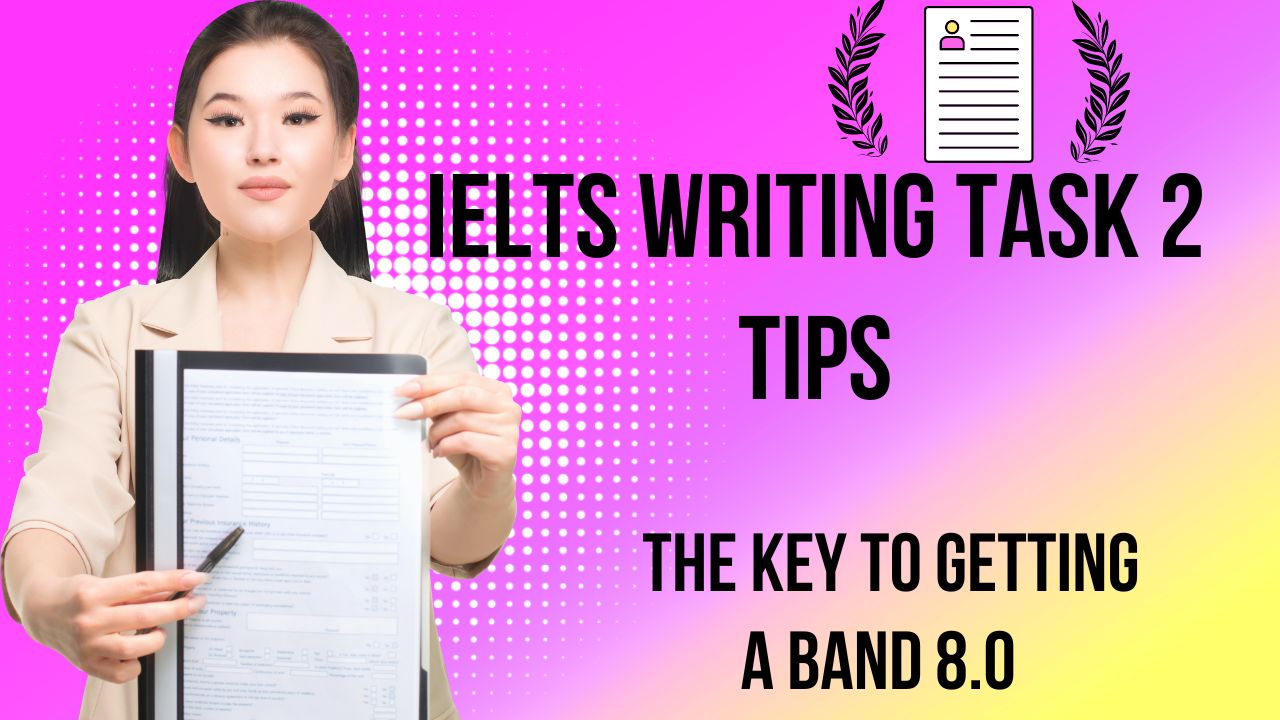IELTS WRITING TASK 2 TIPS: The Key to Getting a Band 8.0
7 Key tips to ensure Your High Score for IELTS Writing Task 2: The IELTS test assesses your abilities in all four skills – listening, reading, writing, and speaking – in under three hours. We have compiled the following tips to help you achieve a high score.
IELTS Writing Task 2 Tips – ANALYZE
Firstly, Spend time understanding the issue or issues raised in the question.
Secondly, Try to analyze questions by focusing on the organizing words [causes, effects, solutions, etc.] contained in the question.
Thirdly, Note Keywords.
For Example, When asked what you think about a certain subject, the most common question is, “How much do you agree [or disagree]?” In what ways do you agree [or disagree? What are your thoughts? Note that these can be combined with questions about causes, etc.
Take note that when you are asked, “To what extent do you agree?” It means you have the right to disagree!
IELTS Writing Task 2 Tips – PLAN
The students with the highest marks in Writing Task 2 always plan their answers for up to 10 minutes. Planning helps you organize your ideas and structure your essay before you write it, saving you time and helping you produce a clear and coherent essay.
- Plan your ideas and supporting points
- Use the focus points in the question.
- Plan to write about four/five paragraphs.
- Make very brief notes about what you are going to write for each paragraph – one idea for each paragraph is enough, keeping this writing structure in mind:
(i) Introduction
The introduction should tell the examiner the rest of the essay and answer the question directly. This tells the examiner that you immediately know what you are doing and helps you write your main body paragraphs.
(ii) Supporting Paragraphs
This is where you give the examiner more detail. You do this by stating your main points and supporting these with explanations and relevant examples.
(iii) Conclusion
You summarize what you have already said in the rest of the body paragraphs. Make brief notes about what you will write for each paragraph – one idea for each paragraph is enough.
IELTS Writing Task 2 Tips – PARAGRAPHS
Enter 4 or 5 paragraphs in total. You must have an introduction and conclusion.
Write in stages.
To connect the paragraph to the introduction, write a statement with a focus word, e.g., The main cause/factor is … Alternatively, you can just state the cause or begin to explain the situation.
- As a rough guide, write about 75/80 words for each paragraph – about 7/8 lines if you write 10 words per line.
- Mark this on the answer sheet and write towards this mark. Repeat this for the subsequent paragraphs.
- As you write, use a pencil, but try not to rub out corrections or changes, as this wastes a lot of time. You also stop the thread of your writing. Cross out any changes with one line. Write above if you have space. Only rub out the text you want to change if you don’t have space to write above.
IELTS Writing Task 2 Tips – TOPIC SENTENCES
The first sentence of the introduction should state the topic of the essay. The second sentence should provide the writer’s opinion and indicate how the essay will be organized (this is the thesis statement).
IELTS Writing Task 2 Tips – LINKING WORDS
Linking words is essential for IELTS writing task 2 to get a high score. The examiner will check your range, accuracy, and flexibility in linking words in the IELTS. Therefore avoid overusing connecting words, especially too many additional words.
IELTS Writing Task 2 Tips – DETAIL
Explain your ideas in depth. Take the leader step by step through your ideas.
IELTS Writing Task 2 Tips – CLARITY
The information should be extremely clear and readable. There should be clarity in the progression of your idea throughout the task. Presenting a clear central topic or idea in every paragraph is always better. The paragraphs should be well-delineated for the evaluator to understand.
It is better to aim for clear meaning rather than aim to impress.
CONCLUSION
It’s important to remember that the IELTS exam is not about testing your knowledge on the subject but about testing your language skills.
You can score a high band if you practice and prepare for the IELTS exam. There are a lot of resources on our WEB PAGE and our Youtube channel that can help you improve your IELTS writing skills.


